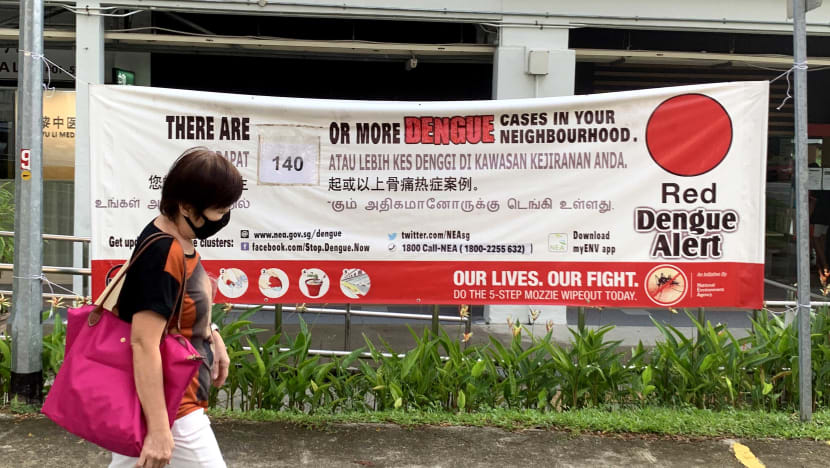Hospitals prepared for spike in dengue cases amid concerns about rising numbers

A Red Dengue Alert signage in Potong Pasir, on Tuesday (Jun 16). Dengue cases have been on the rise ever since early May, during Singapore's COVID-19 circuit breaker period (Photo: Jeremy Long)
SINGAPORE: Hospitals are prepared to cope with a possible spike in dengue cases in the coming months, with data showing high numbers of infections.
“The number of COVID-19 cases is declining and we aim to continue current preventive efforts to control the spread of COVID-19. We have sufficient capacity to cope with (a) dengue surge,” said Professor Leo Yee Sin, executive director of National Centre for Infectious Diseases (NCID).
Adding that the entire healthcare system has been activated to cope with COVID-19 cases while ensuring that other patients receive the care they need, Prof Leo noted that similar efforts will be deployed if more dengue cases require hospital care.
Doctors in Tan Tock Seng Hospital’s (TTSH) emergency department are closely monitoring the situation, she added.
“We keep a lookout for signs and symptoms that suggest dengue among fever patients, and carry out the necessary dengue tests. We also regularly review our hospital capacity to ensure that we are able to manage surges in demand,” said Prof Leo.
On Jun 13, the weekly number of dengue cases in Singapore surpassed the record high reported in 2014, with 895 people infected in just five-and-a-half days.
The total number of dengue cases in Singapore in 2020 reached 10,995 as of 3pm on Jun 19, according to data from the National Environment Agency (NEA).
At least 12 people have died from dengue this year, with the victims aged between 56 and 80.
The total number of cases in Singapore this year is expected to surpass the 15,998 cases recorded last year, and the 22,170 cases reported during the country’s worst outbreak in 2013, the agency said earlier in June.
READ: Spike in dengue cases: Why Singapore may see worst outbreak in years
In the event that the number of dengue cases spikes further, hospitals can expect to see more cases that need to be admitted for monitoring and treatment over a short period of time, said Associate Professor Jenny Low, senior consultant at Singapore General Hospital’s (SGH) department of infectious diseases.
“We are monitoring the dengue cases as well as the number of dengue admissions closely. The hospital has operating procedures in place to cope with such sudden surges and demand,” she added.
Adjunct Associate Professor Steven Lim, chief of emergency medicine at Changi General Hospital (CGH), said the hospital is prepared for a possible spike in dengue cases, and has the capacity to admit dengue patients who require inpatient care.
The trend of admissions for dengue patients is similar for the same period last year, said Prof Lim.
The hospital has collaborated with St. Andrew’s Community Hospital (SACH), which has converted some of its beds to care for COVID-19 patients, he added.
“This helps the hospital to manage its bed capacity so that it can continue receiving dengue and other patients who require inpatient care.”
LESS COMMON SEROTYPE COULD LEAD TO MORE SEVERE CASES
The emergence of the less common DENV-3 serotype could result in a spike in the number of dengue cases due to the low herd immunity for this serotype, said Assoc Prof Low.
The DENV-1 and DENV-2 serotypes have been the predominant circulating strains in Singapore for the last 30 years, she added.
Between 2016 and 2019, the predominant dengue virus serotype was dengue-2. This implies that the majority of Singapore residents would have immunity towards these two serotypes, said Assoc Prof Low.
READ: Not pests, but sources of information: A mosquito analyst's work in the fight against dengue
NEA had said earlier in June that DENV-3 was last dominant in Singapore about three decades ago, which means there is now low immunity in the population.
"This likely explains the unusually high number of weekly cases, hovering between 300 (and) 400, since the start of the year," the agency had said.
People who have been previously exposed to dengue-1 and dengue-2 are also at an increased risk of a secondary dengue infection when the dominant serotype changes, said Assoc Prof Low.
“Secondary infections are one of the known risk factors for severe dengue. Therefore, there is a chance that we may see more severe cases as a consequence.”
DENGUE MANAGED BY PRIMARY CARE DOCTORS
Although the number of dengue cases may surge, experts noted that most cases are mild and can be managed by primary healthcare providers, like general practitioners.
CGH discharges stable dengue patients and advises them to visit a polyclinic or general practitioner for follow-up, said Adj Assoc Prof Lim.
“This has enabled a reduction in the number of dengue patients who require to be warded in the hospital, while ensuring that patients are being managed and cared for safely in the community.”
All patients suspected of dengue will be tested for the virus, and CGH will assess the patient’s condition before deciding whether he or she should be admitted, added Adj Assoc Prof Lim.
WATCH: New facility to produce up to 5 million Wolbachia mosquitoes weekly in fight against dengue
Aside from physical examinations and blood tests, doctors look for signs of severe dengue, and those who have symptoms of such complications will need to be hospitalised, experts said.
For example, patients with persistent fever, a very low platelet count, signs of dehydration and other “warning signs” such as abdominal pain and signs of bleeding may be referred to the hospital, said Prof Leo.
Patients who have a higher risk of complications, such as young children, the elderly and those with other health problems, also have “a lower threshold” to be referred to hospitals.












